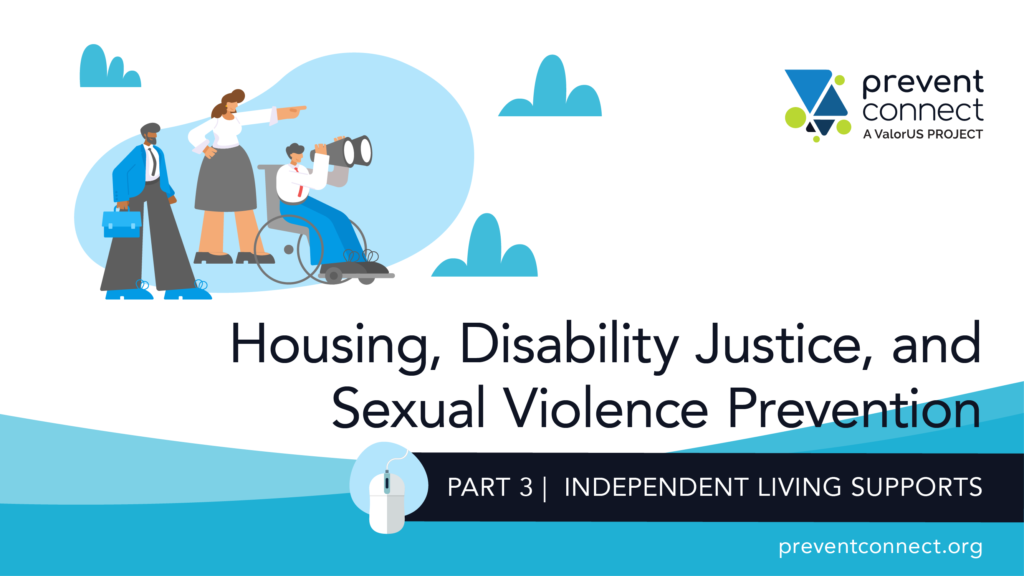Housing, Disability Justice, and Sexual Violence Prevention: Independent Living Supports

This blog was authored by Natalie Sokol-Snyder, VALOR Intern.
This blog is the third in a series on the intersections of disability justice, housing access, and sexual violence prevention. Topics covered include specific barriers to housing for people with disabilities and strategies for sexual violence prevention at this intersection.
Read part 1 here.
Read part 2 here.
Continuing our exploration of the intersections of housing, disability justice, and primary prevention, addressing the housing needs of people with disabilities extends beyond addressing physical and structural accessibility and includes the social context of housing. Providing people with the support and care they need to stay in their homes fosters a number of protective factors, including having autonomy over your home and close connections to community.
Access to high quality, affirming, elective care in one’s place of residence can be an important factor in one’s ability to live independently. Most state governments offer services to provide people with disabilities with varying degrees of in-home care. This blog uses some of California’s programs as examples to consider the possibilities for and limitations of such state-led programs.
California has a number of support services available for Medi-Cal eligible people to receive care at home through federal, state, and regional center programs. The main program is In-Home Supportive Services (IHSS), which provides people with disabilities the care they need to remain safe at home rather than in a long term care facility. Operating statewide, IHSS services are provided by an IHSS caregiver who is chosen by the person receiving the services. All determinations of eligibility and need are made by social workers and IHSS employees, which can make it harder for participants with disabilities to determine what care they need and how it should be administered. This issue persists across a number of California’s other programs that offer in-home support to people with disabilities.
Another, perhaps more promising, of these programs is the Self Determination Program (SDP), which allows people with intellectual or developmental disabilities to have more control in developing their service plans and selecting service providers. The individual makes decisions about their goals and what support they need and want to reach those goals.
While these programs offer important services to people with disabilities, their scope is limited by their funding. Governments, service providers, and sexual violence prevention organizations can work to increase in-home services and promote the leadership of people with disabilities in both developing and evaluating these programs and making decisions about their own in-home care. In promoting protective factors like autonomy and decision making, such programs are clearly aligned with the goals of sexual violence primary prevention.
Financial security is another key factor in a person’s ability to live independently. While the federal government provides some financial assistance to people with disabilities (Supplemental Security Income, SSI), there are strict income requirements that limit who is eligible to receive this funding. When a potential SSI recipient receives support in covering the cost of their food and shelter, the amount of SSI they are eligible to receive is reduced. Such reductions can discourage people from financially supporting their family members and friends with disabilities.
A proposed law would change SSI policy to only reduce the payment amount if the individual received support for their shelter and not if they received support for their food needs. This is an important reform, but it is still highly unlikely that a monthly payment of $914 could cover all of someone’s housing costs in 2023. As the cost of living continues to rise to astronomical rates in most areas of the U.S., it has become increasingly difficult for people with disabilities to support themselves on their SSI income. SSI payment increases would allow people with disabilities to live more independently and would promote economic security.
By promoting multiple protective factors against sexual violence, advocating for policies that increase SSI payments and increase access to in home care can be exciting strategies for prevention practitioners, service providers, and advocates.
For more information about independent living supports and their relationship to ending violence:
The Importance of Home Healthcare
- An interview from IDJ on the importance of in-home care. Watch here.
Medi-Cal Programs to Help You Stay in Your Home or Leave a Nursing Home
- A comprehensive list of California programs for in-home care/care management from Disability Rights California: Check it out here.
Avoiding SSI Reductions when an Adult with Disabilities Lives with Family
- A blog post from the Special Needs Alliance with tips on how to avoid SSI reductions when living with family or friends. Read more here.
Future of Independent Living
- A podcast from the Disability Visibility Project on the independent living movement, challenges, and visions for the future. Listen here.
SSI/SSDI Q and A
- A webinar from Disability Rights North Carolina on how to access and remain eligible for SSI benefits, for people with disabilities and advocates. Watch here.
